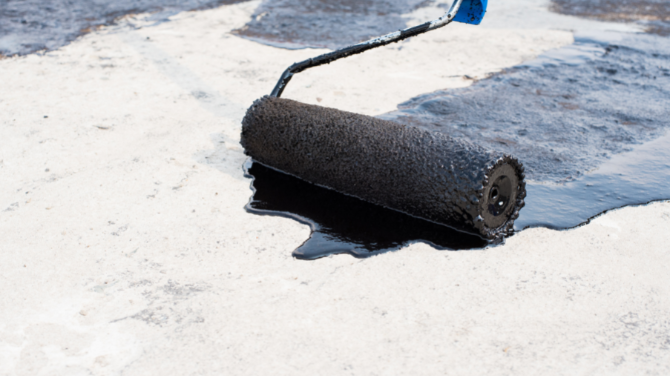The protection of concrete structures depends on concrete waterproofing. The effectiveness and durability of the waterproofing system heavily influence the stability of building foundations and public safety. Concrete waterproofing has so many advantages that it ought to be necessary for every building. It is extremely challenging to reverse or restore water damage to a building’s foundation.
Construction must include concrete waterproofing, especially when high-rise structures are involved. The integrity of the structure is affected by how waterproofing is applied. Poor construction can lead to water damage, endangering the building’s structure as well as the people within as well as their health and safety. Water damage may be prevented and possible risks can be avoided by using correct waterproofing procedures. Concrete and cement-based products may be made more durable and long-lasting by waterproofing them. Keeping water out of concrete is a terrific first step toward greater lifespan, whether you are trying to preserve a cinder block wall, a concrete floor, or poured concrete walls.
It is legal and needed by the building code to waterproof any concrete or block walls you may have. These waterproofing requirements are required by high water tables, flood-prone building areas, or significant rainfall amounts. High-rise building substructures must all be waterproofed. An unsatisfactory material breakdown is intolerable since these are load-bearing walls for tremendously heavy complexes. By waterproofing concrete and other cement-based materials, you increase the structure’s longevity and toughness. Keeping water out of concrete is a terrific first step toward greater lifespan, whether you are trying to preserve a cinder block wall, a concrete floor, or poured concrete walls.
There are some areas where masonry, concrete, or block walls must be waterproofed in order to comply with the building code. Concrete is not perfect, despite appearing to be invincible and presumably remaining long after all of us have passed away. Concrete is particularly vulnerable to assault from chemicals because of its porosity. Without waterproofing, water, salts, and pollutants will be absorbed by the concrete, which will cause the steel supporting it to corrode. When water, salt, or chemicals erode concrete to the point that expansion and cracking might cause failure, this is what is commonly referred to as concrete cancer.
These waterproofing requirements are required by high water tables, flood-prone building areas, or significant rainfall amounts. An unsatisfactory material breakdown is intolerable since these are load-bearing walls for tremendously heavy complexes.
Things to do before waterproofing concrete:
To prepare concrete for waterproofing, make sure the surface is dry and clean. To remove old paint or floor or wall coverings, use a scraper. Make sure there is no hidden filth by giving everything a thorough sweep. If necessary, scrub walls or floors with a solution of warm water and soap, taking care to rinse after each pass. Give drying time to complete. Use a hydraulic expanding concrete mixture to fill in all the holes. Provide the areas at least 24 hours to dry and settle down properly. All objects protruding onto the floor or the walls, such as staircases or electrical boxes, should be taped off.
Here are some key benefits of Water Proofing Concrete:
Structural Strength
By reducing the number of points through which water and moisture can enter via the ceiling, walls, or floor, concrete waterproofing increases the longevity of your structure. The structure can prevent situations like rust, rotting, corrosion, and degeneration if these sections are adequately protected from water penetration.
Helps in maintaining cost
Concrete waterproofing is an appropriate way to manage costly expenses on repairs. You may anticipate having fewer maintenance issues when your facility is free of water damage. Water damage is prone to all electrical work, paintwork, woodwork, and other property items. The smallest quantity of water leaking into a structure can quickly lead to larger calamities because it can accumulate or damage concrete.
Mould prevention
Concrete waterproofing not only secures the integrity of the structure but also guards against health-related issues. Mould or fungus grows as a result of moisture accumulation in the walls and ceiling. These germs have the potential to lead to severe health problems such as allergies, asthma, and compromised immune systems. Dangerous issues may rise if not addressed or prevented.
Provides a healthy environment
Clean living and working spaces are facilitated by effective waterproofing systems. It secures both the structure and its residents. Water is necessary for life, yet it may be harmful if it is present where it shouldn’t be. A building that is prone to water damage is also prone to other flaws, and one mistake might have long-lasting effects on it.
The rise in property valuation
Nobody wants a home with poor waterproofing. Systems for waterproofing concrete can stop water seepage from causing structural damage. It increases the value of your home while maintaining the building’s visual appeal. Buildings that are waterproof make it considerably simpler to clean up after a significant downpour or flood. The waterproof feature greatly simplifies basic maintenance and keeps things neat. When it comes time to sell, a waterproofed basement or flooring is a great selling point. Nobody wants to spend money on a house that has water problems.
Conclusion
Construction must include concrete waterproofing, especially when high-rise structures are involved. The integrity of the building is affected by how waterproofing is applied. Poor construction can lead to water damage, endangering the building’s structure as well as the people within as well as their health and safety. Concrete structures need to be waterproofed if they’re going to last a long time and be useful. Cement-based polymer coatings are used in cementitious waterproofing, a technique for protecting concrete against water and moisture
Redwop is a prime waterproofing manufacturer in India that is involved in the production of a wide array of waterproofing solutions used in numerous residential and commercial construction applications. These solutions are manufactured using state-of-the-art technology and comply with international standards of construction.



